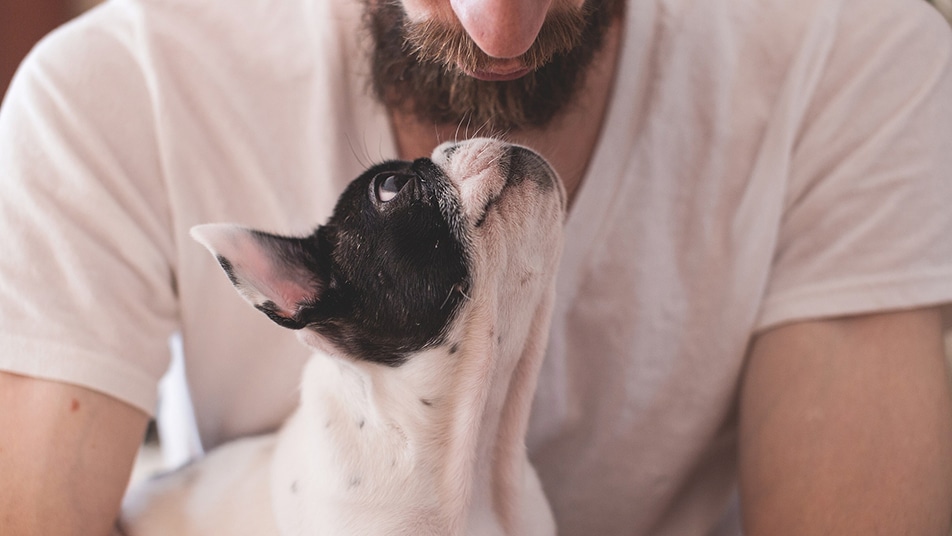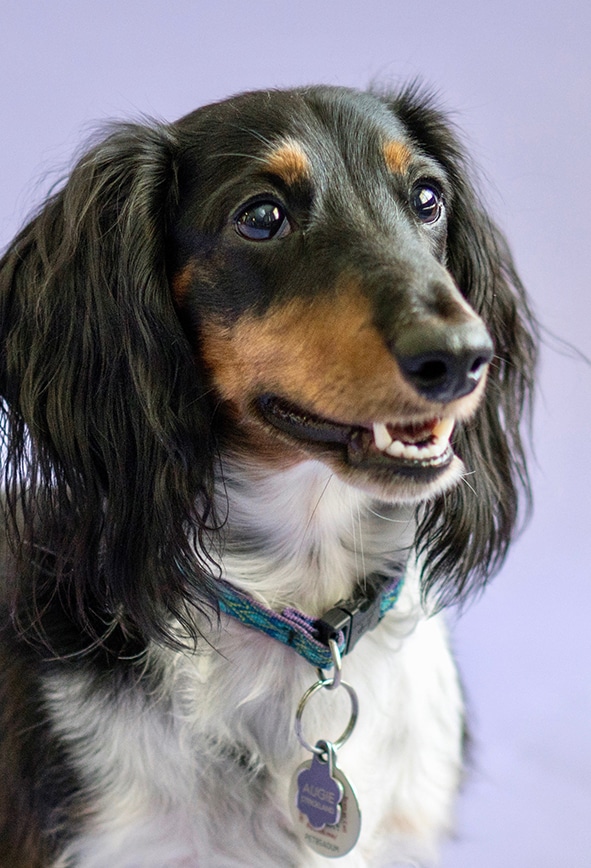Frequently Asked Questions
You’re excited and want to become a therapy animal team with your pet, but you still have questions.


You’re excited and want to become a therapy animal team with your pet, but you still have questions.



Pet Partners does not require, provide, or recommend specific training for therapy animals. Animals that qualify for our program will have these qualities:
Visit our Program Requirements page for details about the criteria for animals in our program.
Yes, although you must have express permission from the animal owner, and you must have been working with the animal for a minimum of 6 months (one year for birds).
Becoming a Pet Partners therapy animal team with your pet has six parts, most of which can be completed online. You can do this on your own timeline, as long as you finish within two years of completing the Handler Course. On average, most people complete their team registrations within 3-6 months.
Learn more about our current registration fee information. Pet Partners is able to offer our industry-leading therapy animal programs, education, and staff support through a combination of registration fees and contributions from generous partners and individual donors. These funds also cover our liability insurance policy. Your registration fee covers one-third of the costs needed to provide these resources during your two-year registration term, and it allows us to continue growing, improving, and advancing our mission.
We welcome all handlers to our Therapy Animal Program, including those with special needs, disabilities, or service animals. As each situation is unique, please contact us to discuss accommodations that may be needed to enhance your experience with us.
First, make sure you’ve created an account in the Volunteer Center and started a team registration—you need that to view any of the resources for Pet Partners registration. Team evaluations are posted on the calendar in the Training Center. You need an in-progress registration to access the calendar.
If there are no evaluations currently posted in your area, you can use our Evaluator Directory to locate team evaluators in your area. Be aware that our team evaluators are volunteers and all evaluation sessions are scheduled and conducted based on their individual time and availability. This calendar is continually updated as evaluators confirm their events, so even if there isn’t something scheduled in your area right now, there could be sessions available in upcoming weeks.
Community Partners are groups composed of Pet Partners volunteers that serve a specific geographic area or facility and who are interested in a collaborative relationship with the national organization. If you’d like to connect with other Pet Partners volunteers online, consider joining the Pet Partners Therapy Animal Community on Facebook. This is a private community for current and prospective Pet Partners volunteers. It’s a great place to ask questions, learn from experienced volunteers, and make connections with other volunteers. (Make sure you have a team registration in progress before you join the Facebook group.)
Many animals can visit safely and successfully with health issues present, and we welcome them! At the same time, we are mindful of animal well-being and infection prevention and control concerns. Animals with disabilities that don’t otherwise impact their health are allowed to register with Pet Partners.
Animals with disabilities must be capable of meeting the requirements for our team evaluation process and complete the evaluation exercises successfully. They may require an accommodation in order to complete the evaluation successfully. Please see the next question for more information about accommodations.
Some animals experiencing select health issues, or those taking certain medications, cannot participate in the Therapy Animal Program, temporarily or at all. If you have any questions at all about your animal’s health or disability issues and Pet Partners eligibility, please contact us and we’ll be glad to assist.
If you or your animal need an accommodation to be successful as a Pet Partners therapy animal team, such as special equipment or modification of an evaluation exercise due to disability, we have a process to arrange for this.
Accommodations require some documentation and review, which can take time to process. If you need an accommodation for your registration, please make sure you have a team registration started on our website, and contact us as soon as possible to discuss it.
The team evaluation consists of a series of exercises that mirror the types of environments and situations Pet Partners teams might encounter when volunteering. The team evaluation is the only part of the registration process that must be done in person, so you’ll need to find out if our program is established in your area. Your evaluation options will increase if you are willing to travel 1-2 hours; keep in mind that you only need to evaluate every 2 years. For more information about what to expect at your team evaluation, you can view our webinar, Are You Ready to Evaluate?
If you receive a Not Ready qualification rating during your team evaluation, it simply means that your team didn’t demonstrate your skills well enough to pass at that evaluation, and it’s not uncommon.
You’re welcome to evaluate again if you would like to. Based on the feedback your team evaluator gave you and by reviewing your score sheet, you should have an idea of what your team can work on before scheduling your next evaluation attempt.
A majority of teams who receive a Not Ready rating and return to evaluate again later pass on the second try.
If you receive a Not Appropriate qualification rating during your team evaluation, it means that your team is not suited to our Therapy Animal Program, and you and that animal won’t be able to register as a Pet Partners team.
Our program isn’t the right fit for every team, and many handlers are glad to have evidence that this isn’t the right path for their volunteering.
Carefully reviewing our program requirements, policies and procedures, and the evaluation overview can help you determine whether you and your animal can meet expectations for our Therapy Animal Program.
Yes! We welcome handlers as young as 10 years old. However, if a volunteer is under 16, a parent/guardian or another approved adult must be present during each visit. A signed permission document from the parent/guardian must be collected from all minors under 18.
Pet Partners volunteers may not affiliate with another organization that registers therapy animal teams or charges a fee to participate in their program when Pet Partners has a similar offering.
You are welcome to volunteer at any facility that is interested in having therapy animal visits. If you’re hoping a specific facility will welcome you when you are registered as a Pet Partners volunteer, the best way to find out whether they have a visiting program or are open to starting one is to inquire directly with the facility.
Registered Pet Partners volunteers have access to open volunteer opportunities posted by our partner facilities. Handlers can respond to posts from facilities there and set up visits (either one-time or recurring) with the facilities you choose, but this is an optional resource. Many handlers find facilities in their communities that would like to have therapy animal visits by reaching out to the facility and asking. They may have a program in place already, or be interested in starting visits when they know a team is available.
We have a helpful Facility Toolkit you can share with prospective facilities. This toolkit provides information on the benefits of therapy animal visits, why Pet Partners teams are low risk for visiting, and how to set up their own therapy animal visiting program.
Pet Partners doesn’t require a specific volunteer commitment. You may choose how often you visit, as long as you visit no more than two hours per day with any individual animal.
You are the best judge of what volunteering schedule works for you and your animal. We want visiting to be enjoyable, fulfilling, and free of stress for both of you.
Pet Partners takes pride that we are the only national therapy animal organization to register such a wide range of species for therapy animal work. Our Therapy Animal Program currently accepts dogs, cats, equines (horses & donkeys), rabbits, guinea pigs, domestic rats, mini pigs, birds (parrots & pigeons), and llamas & alpacas. At this time, we do not register any species other than the ones listed.
Pet Partners does not work with assistance animals or emotional support animals. We specialize in therapy animal teams who go out to facilities in the community and provide therapeutic interactions to the people there rather than to their owners.
For more information about assistance, service, or emotional support animals, we recommend consulting Assistance Dogs International. Their website contains a lot of useful information about assistance animals (not only dogs) and offers a directory of regional resources to browse.
For more information regarding the differences between therapy animals, service/assistance animals, and emotional support animals, please view this informative chart.
We are always looking for new team evaluators! Most team evaluator candidates will be current Pet Partners therapy animal handlers. Current handlers interested in becoming evaluators can learn more in the Get Involved section of the Volunteer Center.
In some cases, Pet Partners will license team evaluators who are not handlers but have particular experience and interest in the team evaluator role, particularly in geographic areas of need. Please get in touch with us to discuss.
Contact us if you have additional questions.Contact us
